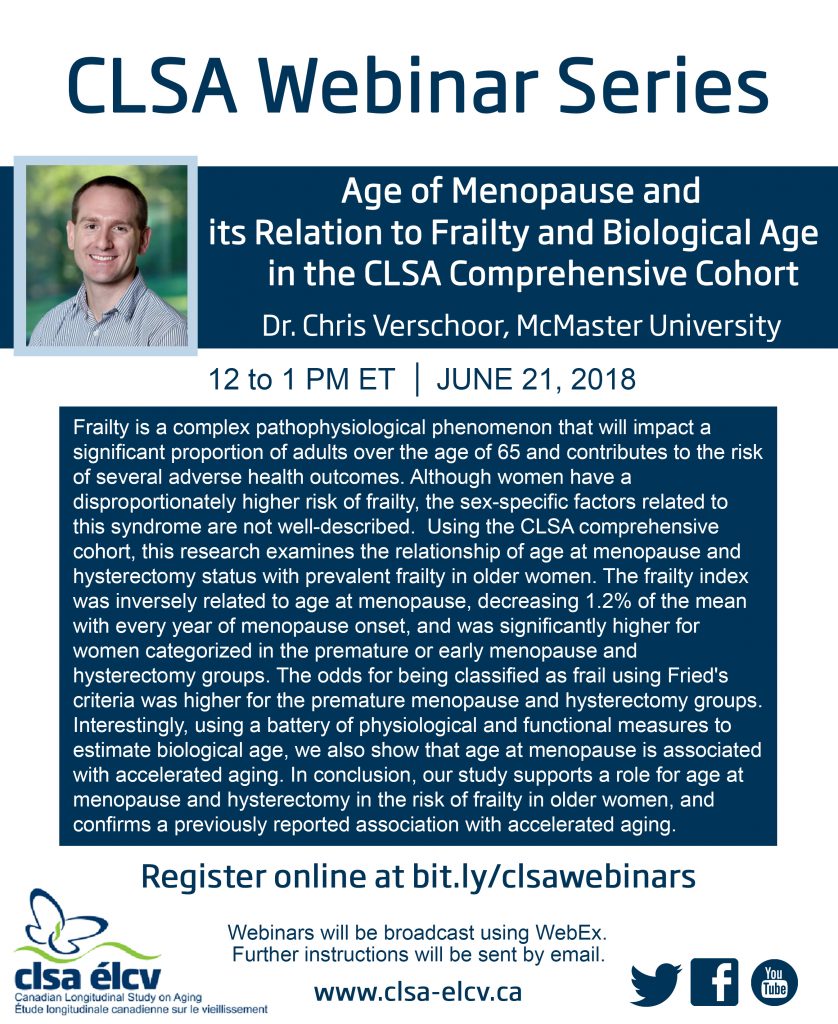Please join us for the final presentation of the 2017-18 CLSA Webinar Series.
 Frailty is a complex pathophysiological phenomenon that will impact a significant proportion of adults over the age of 65 and contributes to the risk of several adverse health outcomes. Although women have a disproportionately higher risk of frailty, the sex-specific factors related to this syndrome are not well-described. Using the CLSA comprehensive cohort, this research examines the relationship of age at menopause and hysterectomy status with prevalent frailty in older women. The frailty index was inversely related to age at menopause, decreasing 1.2% of the mean with every year of menopause onset, and was significantly higher for women categorized in the premature or early menopause and hysterectomy groups. The odds for being classified as frail using Fried’s criteria was higher for the premature menopause and hysterectomy groups. Interestingly, using a battery of physiological and functional measures to estimate biological age, we also show that age at menopause is associated with accelerated aging. In conclusion, our study supports a role for age at menopause and hysterectomy in the risk of frailty in older women, and confirms a previously reported association with accelerated aging.
Frailty is a complex pathophysiological phenomenon that will impact a significant proportion of adults over the age of 65 and contributes to the risk of several adverse health outcomes. Although women have a disproportionately higher risk of frailty, the sex-specific factors related to this syndrome are not well-described. Using the CLSA comprehensive cohort, this research examines the relationship of age at menopause and hysterectomy status with prevalent frailty in older women. The frailty index was inversely related to age at menopause, decreasing 1.2% of the mean with every year of menopause onset, and was significantly higher for women categorized in the premature or early menopause and hysterectomy groups. The odds for being classified as frail using Fried’s criteria was higher for the premature menopause and hysterectomy groups. Interestingly, using a battery of physiological and functional measures to estimate biological age, we also show that age at menopause is associated with accelerated aging. In conclusion, our study supports a role for age at menopause and hysterectomy in the risk of frailty in older women, and confirms a previously reported association with accelerated aging.
Dr. Chris Verschoor is an Assistant Professor in the Department of Health Research Methods, Evidence and Impact. His research focus features a comprehensive approach that combines epidemiological techniques to identify inherent and modifiable risk factors of age-related disease and morbidity, and in vitro and ex vivo molecular methods to examine potential biological mechanisms. This approach often features immune and inflammation related soluble and cell-associated biomarkers that not only correlate with aging and/or age-related disease but also modify relevant cellular innate immune processes.


 Frailty is a complex pathophysiological phenomenon that will impact a significant proportion of adults over the age of 65 and contributes to the risk of several adverse health outcomes. Although women have a disproportionately higher risk of frailty, the sex-specific factors related to this syndrome are not well-described. Using the CLSA comprehensive cohort, this research examines the relationship of age at menopause and hysterectomy status with prevalent frailty in older women. The frailty index was inversely related to age at menopause, decreasing 1.2% of the mean with every year of menopause onset, and was significantly higher for women categorized in the premature or early menopause and hysterectomy groups. The odds for being classified as frail using Fried’s criteria was higher for the premature menopause and hysterectomy groups. Interestingly, using a battery of physiological and functional measures to estimate biological age, we also show that age at menopause is associated with accelerated aging. In conclusion, our study supports a role for age at menopause and hysterectomy in the risk of frailty in older women, and confirms a previously reported association with accelerated aging.
Frailty is a complex pathophysiological phenomenon that will impact a significant proportion of adults over the age of 65 and contributes to the risk of several adverse health outcomes. Although women have a disproportionately higher risk of frailty, the sex-specific factors related to this syndrome are not well-described. Using the CLSA comprehensive cohort, this research examines the relationship of age at menopause and hysterectomy status with prevalent frailty in older women. The frailty index was inversely related to age at menopause, decreasing 1.2% of the mean with every year of menopause onset, and was significantly higher for women categorized in the premature or early menopause and hysterectomy groups. The odds for being classified as frail using Fried’s criteria was higher for the premature menopause and hysterectomy groups. Interestingly, using a battery of physiological and functional measures to estimate biological age, we also show that age at menopause is associated with accelerated aging. In conclusion, our study supports a role for age at menopause and hysterectomy in the risk of frailty in older women, and confirms a previously reported association with accelerated aging.